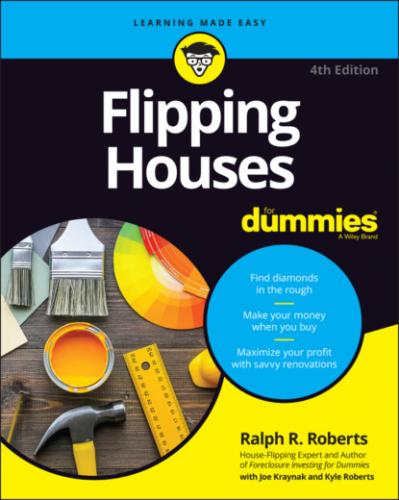Rule No. 1: Never lose money. Rule No. 2: Never forget rule No.1.
— WARREN BUFFETT
Flipping houses is an expensive hobby. You need money — investment capital — to finance the purchase of a house, perform renovations, pay the utilities and taxes, sell the home, and cover your living expenses while you’re hard at work. The good news is that it doesn’t all have to be your money. You can borrow against the equity in your home, persuade family and friends to front you some money, find eager investors who are willing to finance your venture in exchange for a cut of the proceeds, and maybe even finance the purchase of the house through the seller.
If you’re thinking that you can’t possibly get your mitts on enough cash to finance your house flipping venture, this is the chapter for you. Here you discover the myriad sources of house flipping investment capital.
Recognizing the Importance of Being a Cash Buyer
Whether you’re buying a home to live in or to flip, cash is king. It enables you to pounce on a bargain and gives you leverage in negotiating the price you ultimately pay for a property. When you place an offer on a house, and other bids come in, the seller is more likely to accept your offer of thousands of dollars less when you have the cash on hand to quickly close the deal. Why? Because people bidding against you for the same property may need to make their offers contingent upon receiving financing (a loan). If the seller accepts the offer, those other “buyers” can tie up the property for months and then back out at the last minute because their financing fell through.
The seller must then place the house back on the market and start from scratch. Perhaps the deal on the house the seller planned to purchase will fall through as a result or they’ll end up having to make payments on two houses until the old one sells. They may even have to put off their plans to move, or they may be forced to move and leave the house behind, hoping their real estate agent finds a new buyer soon. Many sellers would prefer to accept a much lower cash offer with the assurance that the deal will close.
Ready cash also frees you to plan and begin rehabbing the property immediately rather than wait around for sluggish credit checks and loan approvals. You can have all your materials lined up ready to deliver the day after closing and have your contractors standing at the ready to start working.
Tapping Your Own Resources for Cash
The logical first place to look for cash is to yourself. You probably won’t find enough money to flip a house by emptying your pockets or your purse or looking beneath the cushions on your sofa, but you may have some money sitting in the bank gathering dust, equity in your home and in other possessions that you can unlock, or retirement savings you can put to use in creative ways without making it subject to income taxes and penalties.
In this section, I guide you through the process of taking inventory of the cash and other valuables you may be able to convert to cash to fund your house flipping venture.
Shaking your piggy bank
Chances are good that you have no actual piggy bank, and if you do, it probably doesn’t have much in it. However, you may have some money stashed away in savings and checking accounts or certificate of deposit (CD) accounts. You may also have savings bonds stuffed in a drawer or a lockbox that people have gifted you over the course of your life. A few of them may have matured. See how much money you can scrounge up from what you already have on hand. It may not be much, but it can help finance repairs and renovations.
Unleashing the equity of your current home
Your home is more than just a place to live — it’s an investment, perhaps the best-performing investment you have (or the worst, if property values in your area have dropped dramatically). As you pay down the principal on the mortgage, equity in the home grows (assuming that the house appreciates). Equity is your home’s net worth — if you sold the home today and paid off the mortgage, equity is the money you would stuff in your pocket.
You don’t have to sell your home to pocket the equity. By refinancing the home or taking out a home equity loan, you can unleash the equity and use it (or a portion of it) as investment capital to finance your house flipping venture. I cover both these options, along with the risks of unleashing equity in your home, in the following sections. Further on in this chapter, I show you how to work with banks and other lending institutions to unlock the equity in your home.
Recognizing the risks
If real estate values drop, you may owe more on your home than it’s worth. If you have to sell it, you’ll end up selling it at a loss.
Unlike some types of loans, mortgage and home equity loans use your home as collateral. If you can’t afford the higher house payments on your new loan, you may lose your home in foreclosure.
If interest rates rise, refinancing at a higher rate or for a longer term results in paying more for your current home — potentially, tens of thousands of dollars more — than if you had kept your old, lower-interest loan.
Frequent refinancing can cost you thousands in closing costs that may take you years to recoup.
Refinancing your mortgage
The easiest way to unlock a chunk
